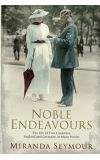
27 Aug 2013 02:30:22
Amid such signs that next year's centenary of the outbreak of the first world war will be used as an excuse for chauvinism against 21st-century Germans, Miranda Seymour deserves to be hailed for her courage, generosity, imagination and decency. She has spent five years investigating the history of Anglo-German relations in order to celebrate the amity and sympathies shared between the two countries since the 17th century. She disapproves of the way the English still buffet, insult and stereotype Germans in ways that would be unacceptable for any other nationality or ethnic group. She dislikes the way that English columnists pick at old scabs, and try to make healed wounds fester anew.
"No two countries in Europe possess a stronger history of cultural and familial sympathy, trust and mutual respect than Britain and Germany," she declares. "Britain's close-knit relationship with Germany predates the Third Reich by over 200 years." She highlights the similar aspirations, mutual enlightenment and common foibles of monarchs, travellers, philanthropists, writers, musicians, scholars, and exiles.
The book is dedicated to the memory of Herbert Sulzbach, who fought for the Kaiser in the first world war, fled to London after the Nazis confiscated his Berlin paper mill, was interned on the Isle of Man as an enemy alien in 1938, and later achieved startling success as a British army sergeant charged with the de-nazification of captured German soldiers and SS officers. Sulzbach worked until his 90s for Anglo-German reconciliation, understanding and tolerance. He upheld the indivisibility of Britain and Germany as partners ensuring Europe's stability and prosperity.
Seymour's story begins in 1613 with the marriage of King James I's daughter Elizabeth to Prince Frederick, the Elector Palatine. They were parents of Sophia, the Electress of Hanover, Queen Anne's heir-presumptive, who predeceased Anne by a few months, and was mother of Anne's successor, King George I. Since then the British royal family has been more German in lineage, sentiments and traditions than anything else. Queen Victoria's love match with her German first cousin Prince Albert, and their descendants' marriages, intensified the Teutonic character of the British royal family.
Seymour tells stories of English tourists in pre-unified Germany, with its independent grand dukedoms, principalities and kingdoms, travelling as music-lovers, as health-seekers to the forests and lakes, and as thrill-seekers after the opening in the 1830s of casinos in the spa towns. Few Germans had the money for foreign holidays, but significant numbers came to England as political exiles – especially after the year of revolutions, 1848.
The most powerful of the German monarchies, Prussia, had an 85% literacy rate in 1850, compared with 52% in Queen Victoria's realm. The Germans generally were reckoned "the most instructed, the most literate, the most thoughtful people in the world," as an English politician acknowledged.
The pace of Noble Endeavours accelerates with the chapter entitled "The Age of Apprehension". The Fleet Street press agitation about naval supremacy resulted in the British government resolving in 1889 to maintain enough battleships to equal the combined strength of the next two largest navies in the world. Germany retaliated with a vast naval-building programme, the European arms race began, and in 1921 debt-ridden Britain conceded naval supremacy to the United States in the Washington treaty.
While some historians hanker for the brute nationalism of that era, Seymour recalls the examples of the imperialist Cecil Rhodes, who died in 1902, having provided for the establishment of the Rhodes scholarships to provide an Oxford university education to Americans and Germans. Rhodes scholarships were closed to Germans in 1914, and not reopened to them for 15 years. Germans were again excluded from the Rhodes scheme in 1939, and with unpleasant pusillanimity not readmitted until 1969. Some may approve this snub to what Hastings calls "Angela Merkel's forebears"; but the magnanimity of Cameron's Oxford college, Brasenose, is more admirable. The memorial to the dead of the second world war in Brasenose's chapel includes the name of a German Rhodes scholar, Carl von Ruperti, who was killed on the Russian front in 1943. It is heart-stopping to anyone who sees it.
In Noble Endeavours Seymour takes Thomas Carlyle's view that the essence of history is innumerable biographies. She rattles through the stories of the painter Sir Hubert von Herkomer, who built a Bavarian schloss in Hertfordshire which the parish council voted to demolish in 1939; of Robert Graves's German mother, and the bullying that his German middle name aroused at school; of DH Lawrence's German wife; of the shrewd, socially indefatigable Irish-German-Jewish connoisseur Count Harry Kessler; and Siegfried Sassoon's love affair with the Kaiser's Bexhill-educated nephew Prince Philipp of Hessen-Kassel.
She recounts the Anglicisation of the Battenberg family into Mountbattens and their takeover of the British monarchy, together with the sojourns of WH Auden, Christopher Isherwood and Stephen Spender in 1920s Berlin, the rise of Hitler, the inanities of the Mitford sisters, and Nikolaus Pevsner's first tour of English architectural sights in 1930. For Pevsner, the foul food and uncomfortable rooms mattered less than the philistinism and rudeness. Dressed in knickerbockers, leather pumps and horn-rimmed spectacles, peering through binoculars, making copious notes and asking earnest questions, he was derided by the Daily Mail readers of his day with their fear of anything new or challenging.
Academic historians will be disappointed that Seymour has used few German-language sources, and concentrates on royalty, the nobility and eminent creative minds rather than on commercial travellers, sportsmen, Thomas Cook tourists, or the German waiters who were predominant in London restaurants until 1914. But there are compensating strengths in her book. One of Seymour's protagonists – a young Englishman who lived in imperial Berlin – was described by his father as "such a loving, bright and always cheery companion, so full of bright hopes, of promise, of talents – and such joie de vivre," before his mental health was wrecked by trench warfare. Loving kindness, merry talent, an unfazed optimism and joy-of-life provide the keynotes of Noble Endeavours.

